Antônio Rafael Pinto Bandeira
Antônio Rafael Pinto Bandeira (1863-1896) was an Afro-Brazilian painter and art professor.
Antônio Rafael Pinto Bandeira | |
|---|---|
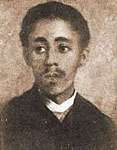 | |
| Born | March 9, 1863 |
| Died | August 28, 1896 (aged 33) |
Biography
He was descended from slaves and his father was a tailor. At the age of sixteen, he entered the Academia Imperial de Belas Artes (AIBA). From 1879 to 1884, he studied with João Zeferino da Costa.[1] He was a regular participant in the "Exposições Geral de Belas Artes", where he won the Gold Medal for history painting in 1883. His first personal exhibition came in 1886 at AIBA.[1]
In 1887, after failing to win a contest that would have enabled him to study in Europe and urged on by his friend Firmino Monteiro, he moved to Salvador,[2] where he became the Professor of Design and Landscapes at the "Liceu de Artes e Ofícios".
Returning to his hometown in 1890 he tried, unsuccessfully, to establish his own art school.[1] He continued to exhibit successfully, but became depressed at having his efforts to launch the school repeatedly thwarted. He drowned in Guanabara Bay, apparently while attempting to launch a boat, although his family and the press suggested that it may have been suicide.[2] The body was not recovered for almost two weeks, so he was buried without an autopsy.
His painting "Lenhador" (Woodcutter) appeared on a two-part commemorative stamp in 2013,[2] together with a painting by Georgian artist Niko Pirosmani, to mark the establishment of diplomatic relations between the two countries.
Selected paintings
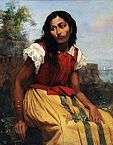 Young Woman Sitting
Young Woman Sitting Portrait of a Student
Portrait of a Student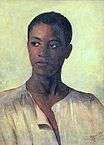 Man's Head
Man's Head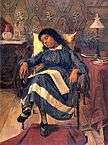 Sleeping Woman
Sleeping Woman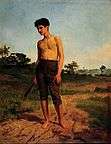 The Woodcutter
The Woodcutter
References
- Brief biography @ the Enciclopédia ItaúCultural.
- Biography @ the Prefeitura Niterói website.
Further reading
- José Roberto Teixeira Leite, Pintores negros do oitocentos, Edição Emanoel Araújo. São Paulo: MWM-IFK, 1988
External links
| Wikimedia Commons has media related to Antônio Rafael Pinto Bandeira. |
- Georgian Journal: "Brazil Dedicates Stamp to Diplomatic Relations" by Ketevan Charkhalashvili.